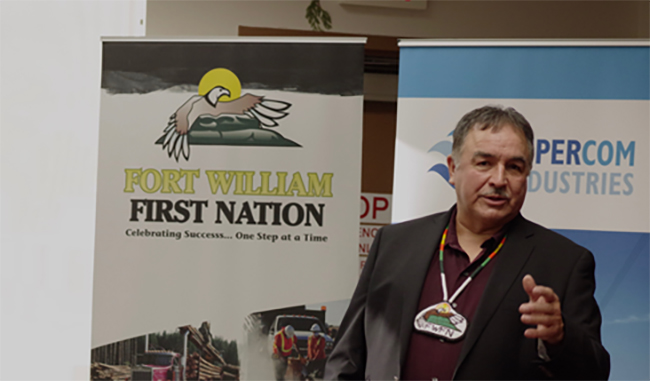Fort William raises issue of tax on lands received back from Grand Trunk Pacific

By Rick Garrick
Fort William recently raised the tax situation on lands they received back from the GTP (Grand Trunk Pacific) land taking in 1905 during a joint council meeting with Thunder Bay.
“What we’ve been working on right now is making the ultimate argument that the land is still Fort William as it was in 1905 and that is why we no longer recognize the taxing authority the city (of Thunder Bay) has on it or the province has on it,” says Fort William Chief Peter Collins. “One of the things we are arguing is that in 1905 when our land was wrongfully expropriated from the community of Fort William, Fort William never relinquished its authority on those lands or gave up the status of those lands, so the land is still under our First Nation authority. The provincial government and the municipal authority do not create laws on land that rightfully belongs to us.”
Collins says the community was compensated for the loss of the use of the land through the GTP Settlement Agreement, which included a $98,933,310 global settlement offer from the federal government. The agreement was signed in Dec. 2016.
“The land was officially returned to us by the rail company in 1999,” Collins says. “But we still argued from 1999 to this date that we never relinquished our taxing authority on the land or we’ve never given up our status of the land. There is no Order in Council from our previous leadership in 1905 (that) relinquishes the land as rightfully ours. So we’ve been telling the province and the municipality that their laws and their taxing laws and their taxing authorities do not belong on land that rightfully belongs to Fort William.”
Fort William first submitted the GTP claim for negotiation with Canada in 1999, and Canada accepted the claim in 2002 on the basis that the land was sold for less than it was worth in 1905. The land included the community’s entire Mission site, including homes, farms, the church and the traditional burial site.
“For 113 years the city and the province have benefitted on land that our community should have been benefitting on,” Collins says. “That is the other argument that we are making, that it is time for us to benefit off the land that rightfully belongs to us. This will end the era of the wrongful taking of our community.”
Norm Gale, city manager for Thunder Bay, says the city is required by provincial law to collect taxes on land within its municipal boundary.
“The city has no lawful option today to not collect those taxes,” Gale says. “Having said that, in the spirit of friendship and reconciliation, we are working earnestly with Fort William and Ontario to look for other means, other ways to address this situation. We are hopeful that we can find a way to resolve this situation soon. We are working in good faith with Fort William and we want to get it done.”
Thunder Bay officials also recently discussed the taxation issue with provincial officials during the Ontario Good Roads Association Conference in Toronto.
A spokesperson with the Ministry of Indigenous Relations and Reconciliation says in an email reply that the provincial government recognizes this is a complex issue involving all four levels of government – the First Nation with Canada, Ontario and the municipality.
“In Ontario, First Nations reserve lands are exempt from property taxation under the federal Indian Act,” the spokesperson says. “Lands outside of reserves and inside municipalities that are owned by or on behalf of First Nation communities are liable for property taxation under Ontario’s Assessment Act. (prior to 1998, off-reserve “property held in trust for a band or body of Indians” was exempt from taxation under the Assessment Act, but this exemption was repealed for newly-acquired land located in municipalities as of Jan. 1, 1998). Ontario supports a negotiated resolution to these matters and hopes progress can be made through dialogue with all concerned.”

